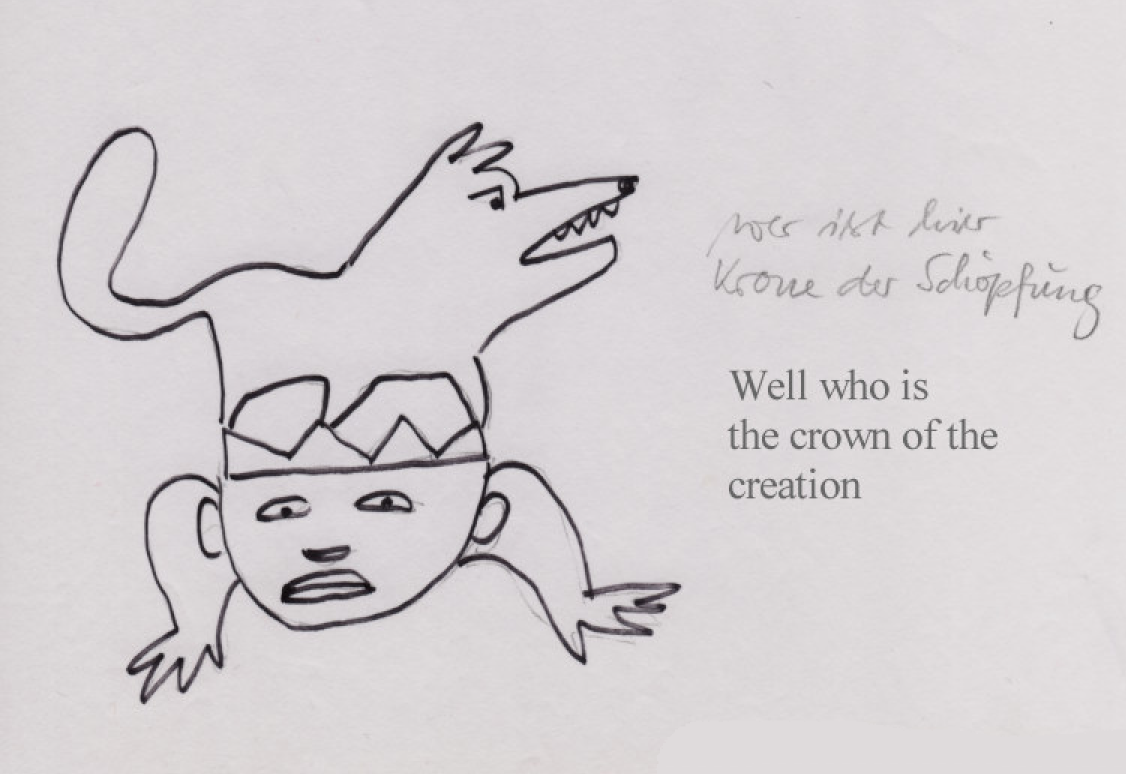Companion Animals in microsanctuary squats and insisting on the outraged mode
This is a paradox:
People choosing rhetorics to address speciesist-eating-behaviour by saying “what about you ate that other Nonhuman then?“ – the carnist approach in circumventing the bigger picture – however saying at the same time: “Do not pass on communication that is morally outrageous” [1] in an interview with a group that disseminates news about atrocities that are being done to nonhumans.
You have to pass on the facts. And logically the facts that happen in this world are causing outrage in many people.
To suggest you stop people from being willing to eat most brutally humiliated and killed Nonhumans by just making them aware that Companion Animals are „also animals“ that we might „treat better“ because we don’t „eat them“. Yet the actual „better treatment“ only takes place in our warped speciesist anthropological settings.
That we might do different things to different Nonhumans in different spaces, does not change the overall problem we are dealing with.
Another author suggested we should not “keep pets” if we were “truly empathic”, for the obvious reasons of neglect and exploitation. And since that author is an expert on environmental history, he also tells the reader about all other detrimental aspects to earth and humans that are the annual results of ignorant human “pet keeping”: https://www.theguardian.com/commentisfree/2023/feb/04/want-to-truly-have-empathy-for-animals-stop-owning-pets (accessed 10.02.2023). A differentiation between contexts, the history of Nonhumans, is not being addressed, also not the importance of exact situations in which Nonhuman individuals and groups are. The classic “pet” friend is not a monolith anymore. Animal Rights ideas are emerging in all different social segments of our societies … .
We should be speaking about Nonhumans living with Humans in a more differentiated way:
Overall Humans take up any spaces – and even that is a far too generalized statement (land grabbing, housing and architecture policies …). The move that has an effect on Nonhumanity is though that “Humans” dominate specieswise.
Why should Nonhumans not share spaces with Human in contexts of mixed communities, ranging from a microsanctuary to a large sanctuary and to “private” space being shared?
Many Nonhumans can’t just easily live outside and living outside would also mean we need rights to safeguard Nonhumans from Human aggressions, like hunting, like the violent actions we can follow daily in the petition lists of for example https://ladyfreethinker.org/ , like people damaging habitats … an endless list.
In terms of justice we should not make differences between “Companion Animals” and “Wild” Animals, Feral Animals and Farm Animals.
We should change our compartmentalized and foremostly unjust thinking and attitudes as Humans towards all Animality, and this in context with all environmental questions as questions of habitat that needs to be protected and safeguarded, wherever possible and by all means. (And how these Habitats look is not to be decided by the old speciesist approaches, when we need to be far more realistic in what is possible in the foreground of safety and saving lives … .)
The ways in which we leave our stamp, as human societies and human cultures, on both Nonhuman Animality aswell as on how we don’t want to be able to imagine more reasonable encounters and contextualities between Nonhumanity and Humanity, reflects our dominant stance of impossibility: as if there was only one way and one pattern to live as a homogenous crowd of Homo sapiens.
…
Back again to the idea mentioned above of not “communicating” things that are “morally outrageous”. I looked at what kind of approach this thought stems from:
Both, the idea of
1.) creating awareness for Nonhuman issues, by suggesting for the other to imagine the slaughtered-sold-displayed-and-eaten-victim to be a Companion Animal instead, and thus becoming morally aware of the wrongs, by means of comparison,
and
2.) the psychological approach in regards to activism that we looking at here, that applies a soft pathologizing (as typical in I guess the most classical psychological schools).
and I landed at this site: https://veganadvocacy.org/who-we-are/
working with the principles of Effective Altruism – an approach of activism that has come under attack for their philosophy and strategies, for instance just now in this publication, yet there are more … :
The Good It Promises, the Harm It Does Critical Essays on Effective Altruism. Edited by Carol J. Adams, Alice Crary, and Lori Gruen, 2023.
The kind of utilitarianist approach is also much to be found in the environmentalist milieu. I wonder if the notion of “altruism” seemed, in a reductively technocratically informed society, the best way to bring Nonhumans into play, without moving away from the old concepts that run our discourses and logics about the Human > Animal > Nature triangular problematic in the Anthropocene.
—
[1] Melanie Joy in an interview with Lady Freethinker, https://ladyfreethinker.org/on-anger-and-activism-a-qa-with-dr-melanie-joy/ , accessed 10.02.2023
